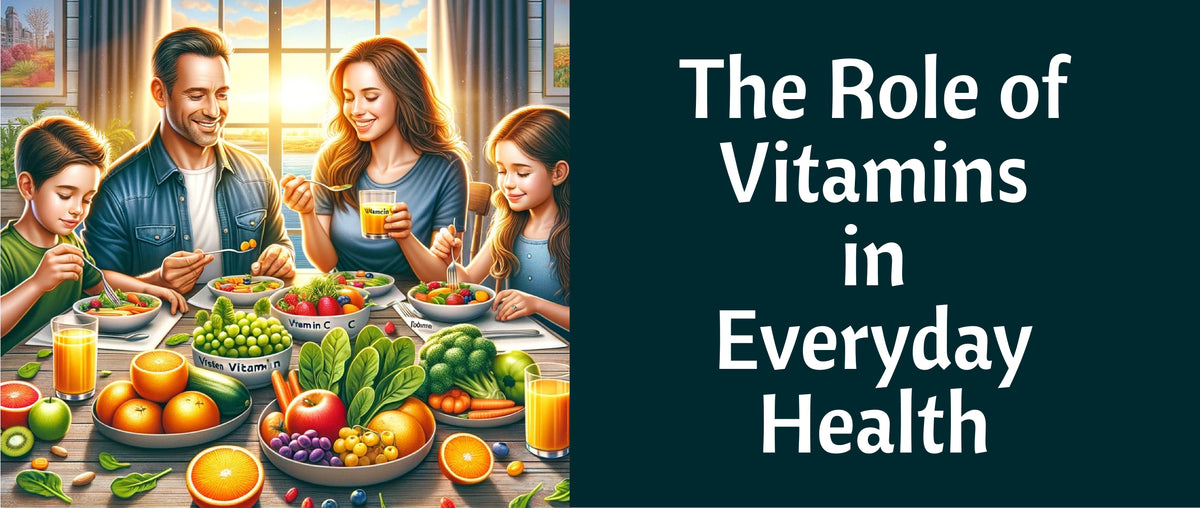The Role of Vitamins in Everyday Health
What Are Vitamins?
Vitamins are organic compounds that are crucial for normal growth and nutrition, and necessary in small quantities in the diet because they cannot be synthesized by the body. There are two main categories of vitamins: water-soluble and fat-soluble. Water-soluble vitamins, which include all the B vitamins and vitamin C, must be taken into the body daily as they are not stored. Fat-soluble vitamins such as Vitamins A, D, E, and K, are stored in the liver and fat tissues until needed.
Essential Vitamins
Every vitamin plays an essential role in the body, from supporting bone health and boosting the immune system to enhancing muscle recovery. For example, Vitamin D is crucial for calcium absorption and bone growth, while Vitamin C helps with the repair of tissues and the enzymatic production of certain neurotransmitters. These properties make them vital components of a healthy diet.
How Vitamins Work
Vitamins act as catalysts for metabolic reactions and other functions within the body. For instance, B-complex vitamins are necessary for converting carbohydrates into glucose, which provides energy to the body. This process is particularly important when considering best foods for weight loss because efficient metabolism can help manage and reduce body weight by utilizing food energy better.
The Benefits of Vitamins: What Can Vitamins Do for You?
Vitamins can enhance your health in numerous ways:
- Vitamin A: Essential for good vision, skin health, and proper immune functioning.
- Vitamin E: Acts as an antioxidant and helps in cell repair and is found in many Healthy Snacks for Kids.
- Vitamin K: Important for blood clotting and bone health.
Including high protein snacks in your diet is another way to leverage the benefits of vitamins. Foods rich in protein like Greek yogurt or a slice of vegan cheese also often contain B vitamins, which help the body extract energy from food and support muscle recovery.
Natural Sources of Vitamins
Best Foods for Vitamin Intake
To maintain optimal health, incorporating a variety of vitamin-rich foods into your diet is essential. Fruits and vegetables are famously rich in vitamins and minerals. For instance, citrus fruits are high in Vitamin C, while carrots provide a good dose of Vitamin A. When considering a plant based diet, foods like spinach and other leafy greens are excellent for Vitamin K. Including healthy drinks such as kombucha, which contains B vitamins, can also contribute to your vitamin intake.
Vitamins in Different Diets
Adjusting your vitamin intake based on dietary preferences is crucial for maintaining health. For those on a vegan diet, it is important to find plant-based sources of typically animal-derived vitamins, like Vitamin B12 found in fortified foods and supplements. Low-calorie foods that are rich in vitamins include bell peppers, broccoli, and strawberries, making them ideal for weight loss diets.
Seasonal Availability and Vitamin Retention
The availability of certain vitamins can vary by season, which influences their abundance in fresh produce. For example, Vitamin D is naturally obtained from sunlight during sunny months but may require supplementation during the winter. To maximize vitamin retention in foods, use cooking methods that preserve vitamins, such as steaming or roasting, rather than extensive boiling.

The Truth About Supplements
When Are Supplements Necessary?
Supplements can play a key role in bridging nutritional gaps but should not replace a balanced diet. They are particularly crucial for certain populations, such as older adults who may need more Vitamin D, or pregnant women who require folic acid. Consulting a healthcare provider can help determine if you need supplements based on your health needs and lifestyle.
Risks of Over-Supplementation
Taking vitamins in excessive amounts can lead to toxicity, particularly with fat-soluble vitamins like Vitamins A, D, E, and K, which can accumulate in the body. Water-soluble vitamins, while generally safer, can still cause adverse effects when taken in large doses, such as an increased risk of kidney stones from too much Vitamin C.
Choosing the Right Supplements
If you decide to use supplements, choose those verified by a third party, such as USP or NSF, to ensure quality and purity. Remember that supplements should complement your diet, not compensate for unhealthy eating habits. Always aim to get most of your nutrients from food sources, like the best foods for weight loss that naturally contain fiber and essential vitamins.
Preventing Vitamin Deficiencies
Signs of Vitamin Deficiency
Vitamin deficiencies can lead to significant health problems, each manifesting with specific symptoms. For instance:
- Vitamin D deficiency might cause bone pain and muscle weakness.
- Lack of Vitamin C can lead to scurvy, characterized by anemia, gum disease, and skin hemorrhages.
- Insufficient Vitamin B12 intake can result in fatigue, megaloblastic anemia, mood disturbances, and nerve damage, particularly in elderly individuals who may struggle with nutrient absorption.
At-Risk Populations
Certain groups are more prone to vitamin deficiencies due to various dietary and physiological factors:
- Older adults often require more Vitamin D and B12.
- Pregnant women need higher amounts of folic acid to prevent congenital disabilities.
- Vegans and vegetarians might be at risk for Vitamin B12 deficiency since it is primarily found in animal products, making it crucial to include fortified foods or supplements.
Addressing Deficiencies Through Diet
To prevent vitamin deficiencies, incorporating a diverse range of foods into your diet is essential. For example:
- Healthy Snacks for Kids: Nutrient-rich snacks like sliced fruits, nuts, and yogurt can provide essential vitamins for growth and development.
- Including best foods for weight loss that are also vitamin-rich can help maintain nutrient intake while dieting.
Current Research and Trends in Vitamin Science
Recent Studies on Vitamin Efficacy
New research often brings light to the efficacy and potential health impacts of vitamins. For instance, ongoing studies investigate the role of Vitamin D in preventing autoimmune diseases or the potential of Vitamin C to enhance immune function. Such studies help refine dietary recommendations and supplement use.
Innovations in Vitamin Delivery Systems
Advancements in nutritional science have led to the development of more efficient ways to deliver vitamins and increase their bioavailability. For example, liposomal delivery systems for Vitamin C have been shown to allow for greater absorption by the body than traditional forms.
Conclusion
Vitamins are essential to maintaining health and preventing disease. By choosing the right foods and supplements wisely, based on current scientific research and individual health needs, one can ensure they are getting the nutrients they need to live a healthy, vibrant life.
A balanced approach to nutrition, emphasizing food-based vitamin intake with supplements when necessary, is ideal for maintaining health and preventing disease.
Do you enjoy vegan food? We have a list of vegan restaurants in India to help you find delicious options in your area!










